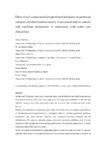Mostrar o rexistro simple do ítem
Effect of self-administered intraperitoneal bemiparin on peritoneal transport and ultrafiltration capacity in peritoneal dialysis patients with membrane dysfunction: a randomized, multi-centre open clinical trial
| dc.contributor.author | Peso Gilsanz, Gloria del | |
| dc.contributor.author | Bajo Rubio, María Auxiliadora | |
| dc.contributor.author | Pérez-Fontán, Miguel | |
| dc.contributor.author | Martínez, Javier | |
| dc.contributor.author | Marrón, Belén | |
| dc.contributor.author | Selgas, Rafael | |
| dc.date.accessioned | 2023-04-26T07:50:22Z | |
| dc.date.available | 2023-04-26T07:50:22Z | |
| dc.date.issued | 2012-05 | |
| dc.identifier.citation | Del Peso G, Bajo MA, Fontán MP, Martínez J, Marrón B, Selgas R; Group of Study on Bemidextrin. Effect of self-administered intraperitoneal bemiparin on peritoneal transport and ultrafiltration capacity in peritoneal dialysis patients with membrane dysfunction: a randomized, multi-centre open clinical trial. Nephrol Dial Transplant. 2012 May;27(5):2051-8. | es_ES |
| dc.identifier.issn | 0931-0509 | |
| dc.identifier.uri | http://hdl.handle.net/2183/32939 | |
| dc.description | Randomized controlled trial | es_ES |
| dc.description.abstract | [Abstract] Background: Progressive peritoneal membrane injury and dysfunction are feared repercussions of peritoneal dialysis (PD), and may compromise the long-term feasibility of this therapy. Different strategies have been attempted to prevent or reverse this complication with limited success. Methods: We performed a randomized, open multi-centre trial, aimed at scrutinizing the efficacy of self-administered intraperitoneal (i.p.) bemiparin (BM) to modulate peritoneal membrane dysfunction. The main outcome variables were peritoneal creatinine transport and the ultrafiltration (UF) capacity, estimated during consecutive peritoneal equilibration tests. The trial included a control group who did not undergo intervention. The treatment phase lasted 16 weeks with a post-study follow-up of 8 weeks. Results: Intraperitoneal BM did not significantly improve creatinine transport or the UF capacity, when the whole group was considered. However, we observed a time-limited improvement in the UF capacity for the subgroup of patients with overt UF failure, which was not observed in the control group. Intraperitoneal injection of BM did not carry an increased risk of peritoneal infection or major haemorrhagic complications. Conclusions: Our data do not support the systematic use of BM for management of peritoneal membrane dysfunction in PD patients. Further studies on the usefulness of this approach in patients with overt UF failure are warranted. Intraperitoneal administration of BM is safe in PD patients, provided regulated procedures are respected. | es_ES |
| dc.language.iso | eng | es_ES |
| dc.publisher | Oxford Academic | es_ES |
| dc.relation.uri | https://doi.org/10.1093/ndt/gfr546 | es_ES |
| dc.rights | This is a pre-copyedited, author-produced version of an article accepted for publication in Nephrology Dialysis Transplantation following peer review. The version of record is available online at Oxford Academic web page. | es_ES |
| dc.subject | Bemiparin | es_ES |
| dc.subject | Heparin | es_ES |
| dc.subject | High peritoneal transport | es_ES |
| dc.subject | Peritoneal membrane | es_ES |
| dc.subject | Ultrafiltration failure | es_ES |
| dc.title | Effect of self-administered intraperitoneal bemiparin on peritoneal transport and ultrafiltration capacity in peritoneal dialysis patients with membrane dysfunction: a randomized, multi-centre open clinical trial | es_ES |
| dc.type | info:eu-repo/semantics/article | es_ES |
| dc.rights.access | info:eu-repo/semantics/openAccess | es_ES |
| UDC.journalTitle | Nephrology Dialysis Transplantation | es_ES |
| UDC.volume | 27 | es_ES |
| UDC.issue | 5 | es_ES |
| UDC.startPage | 2051 | es_ES |
| UDC.endPage | 2058 | es_ES |
Ficheiros no ítem
Este ítem aparece na(s) seguinte(s) colección(s)
-
GI-FENM - Artigos [106]






